To explore the full set of age-related legislation in the area of Health,
you can download the PDF or the Excel version. The full data set for all thematic areas is also available for download.
health
The field of health has numerous consent and capacity criteria and contrasts significantly with rights afforded to children in other areas. The legal drinking and smoking age are fixed and consistent across the region.
The legal minimum ages at which children and adolescents can access services, and are allowed to give independent informed consent to medical interventions and treatment, are higher than in many of the other domains. This includes sexual and reproductive and mental health services.
This is most strikingly seen in the limited and restricted ability of children and adolescents to consent to medical treatment, access confidential advice, and request an abortion independently. The field of health has numerous consent and capacity criteria and contrasts significantly with rights afforded to children in other areas. The legal drinking and smoking age are fixed and consistent across the region.
Substance use and remedies
Also within the health domain is the legal access to substances such as tobacco and alcohol, as well as the access to harm reduction services. The forthcoming CRC General Comment No. 20 recommends that “in view of the degree of risk and harm associated” with the consumption of alcohol and tobacco the minimum age limit should be 18 years” (Para. 44).
Nearly all countries in the region comply with this recommendation, with only Bosnia and Herezegovina allowing smoking at the age of 15. Kazakhstan has set an even higher legal drinking age at 21, and in Uzbekistan, both alcohol and tobacco may only be sold to those above the age of 20. On the access to harm reduction services, little information could be found.
Sexual, reproductive health and abortion
For adolescents, another key area within the health domain are sexual and reproductive health services. In the CEE/CIS region, abortion is legal in all countries and all countries have set a minimum legal age for abortion with the exception
of Azerbaijan and Moldova. The lowest age is 14 years in both Georgia and Ukraine. Georgia is a particularly unique example as it not only has the lowest minimum age for abortions, but that it also does not require parental consent.
The Georgia Law on Patient Health Rights (last amended in 2015) stipulates in Article 40 that,
[i]nformation about a minor’s health status may be withheld from parents or legal representatives when … a minor patient aged 14 to 18 who, in the opinion of a medical care provider, can evaluate his/her health condition correctly and who referred to the doctor for treatment of sexually transmitted diseases or drug addiction, or for taking advice on non-surgical methods of contraception or for artificial termination of pregnancy.
In seven other countries (see the table at the end of the section for details), the age is 18 years, meaning that children are prohibited from having an abortion. The majority of these countries are from the Central Asian sub-region.
Six countries have set the age at either 15 or 16 years, and seven countries have set a minimum age but require parental consent, consent by the father, proof of capacity, or the permission of a court or parents. An interesting regulation
is found in Bosnia, where “requests for the termination of pregnancy of a minor pregnant woman must be submitted by one of the parents or the guardian on her behalf if she has not reached the age of 16 or does not earn a living through
work” (CRC State Report by Bosnia and Herzegovina CRC/C/11/Add.28, 2004, para 230, 231).
Thus, a minor must be 16 years to have an abortion without parental consent or she must be employed. If she is not employed, she cannot take this decision independently below the age of 16. Additionally, a child between 14-16 years can
refuse an abortion, even if her parents want one, but will not be allowed to have one if her parents do not consent: “Despite a request by parents, the termination of pregnancy of a person who has reached the age of 14 cannot be carried
out without her own consent.”
The age at which children can access independent medical advice on contraception is less clear, with five countries being unclear and no data found for a further five countries. Where minimum ages
are set, they vary across the region from 10 years in Armenia to 18 years in Kazakhstan, Macedonia and Moldova. The lack of availability of independent family planning advice contrasts with the lower age of consent across the region.
Furthermore, there is often a marriageable age that is often lower than 18 years, meaning that a married individual may not be able to accept contraception advice or have access to abortions without consent or additional proven capacity.
Where information on independent access to confidential testing and treatment of sexually transmitted infections (STI) could be obtained, it is usually aligned with other minimum ages in the health domain, with the exception of Armenia,
where STI testing is possible at the age of 14.
Medical advice and treatment
Two key questions in the field of health are: a) the access to confidential health advice, and b) the consent to treatment. Across the CEE/CIS region, the ability of children and adolescents to independently consent to b) medical treatment
varies significantly (see table at the end of the section for details). In seven countries, children under the age of 18 cannot make independent health choices, always needing parental or guardian approval (Bulgaria, Romania, Macedonia,
Armenia, Azerbajan, Turkey and Tajikisztan). In two countries, the age is 18 for consent to complex procedures with possible adverse consequences for the child, but lower otherwise. These two countries are Kazakhsztan, where the general
age for independent health decisions is 16, and Russia, where children that show competence can receive independent treatment at the age of 15. Georgia and Turkemistan specify that emancipated minors can make independent health choices,
even though the general age to make complex independent medical decisions is set higher. Hence, in these two countries, the right to independent health decisions is tied to majority (which can be attained earlier), rather than a fixed
minimum age.
The lowest age at which a child can make independent health choices are in Belarus and Uzbekistan, at 14 years. In Croatia, Kyrgysztan and Moldova, the age is set at 16. In Montenegro and Serbia, the age is set at
15 with the additional need for the child to prove capacity. Overall there is no clear regional pattern, except that all Central Asian countries do not allow children to make independent health choices.
For those countries of the region for which data regarding access to independent medical advice is available, the average age to access medical advice is above 15, and it would be higher if not for the notable exception of Serbia. The Serbian
Law on Patients’ Rights ensures that confidential counselling is provided to any child that is capable for reasoning, irrespective of age and without parental consent if that is in the best interest of the child. It is the only law of
this type in the region. Apart from Serbia, access to independent medical advice is often as high as for medical interventions (see table at the end of the section).
◼ 18
◼ 16
◼ 15
◼ 14
◼ 0
◼ unclear
◼ n.d.
Age at which children/adolescents can seek independent medical advice
What adolescents said: Views on medical advice in five countries
During our consultation adolescents felt strongly capable to exercise their participatory rights in health, such as seeking medical advice alone without a parent/or guardian, if they wanted.
Overall, 62% of respondents “agreed” or “strongly agreed” that they were capable enough to speak to a doctor independently, with capability increasing as the age of the respondent increased. From the age of 14, more than half of respondents from each age group felt that they could speak to a doctor independently.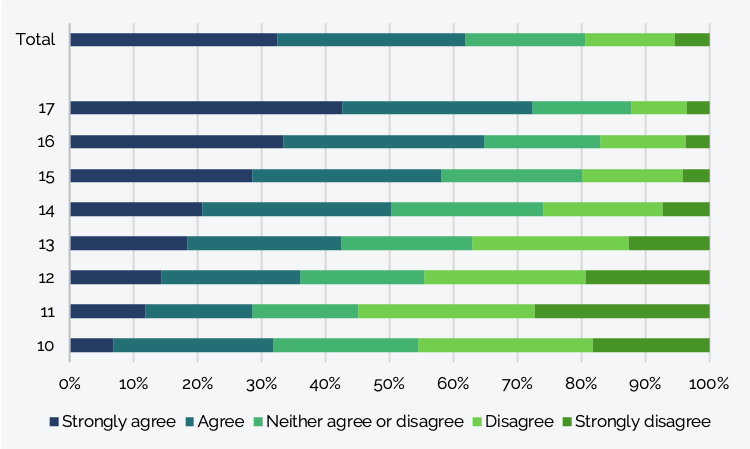
“I am capable enough to:” “talk to a doctor by myself without my parents/guardians” by age
Even more respondents felt that they should be allowed to speak to a doctor independently. An average of 66,5% of respondents “agreed” or “strongly agreed” that young people their age should be able to seek medical advice independently.
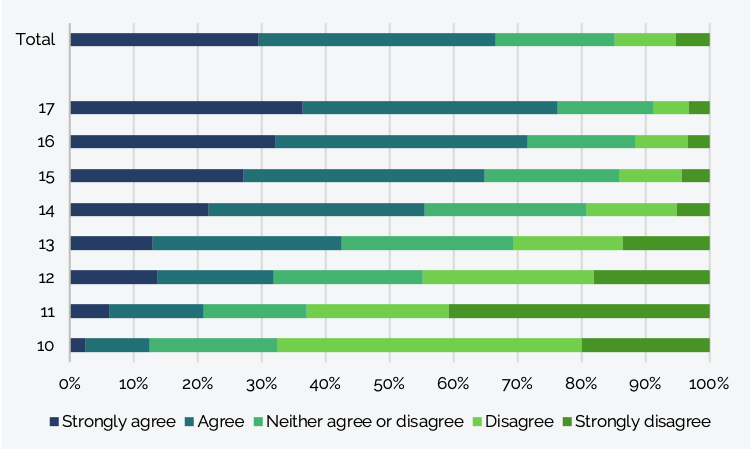
How much do you agree with the following statement? “A young person your age should be able to seek medical advice by themselves without their parents/guardians, if they want to” by age
When testing their knowledge of the age that a person can seek medical advice independently, more than half of the respondents thought that the age was lower than it actually was in their respective countries, which is 14 at its lowest (Ukraine) and 18 at its highest (Armenia, Kazakhstan, Romania).* Only 27% of respondents selected the correct answer.
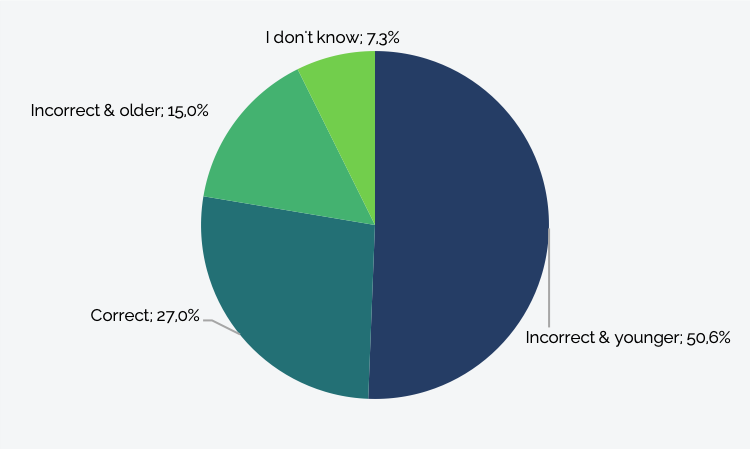
From what age can a young person seek medical/health advice by themselves?
During the consultation, adolescents said that they did not always have access to the medical advice that they needed. Approximately 1 in 6 respondents (15%) reported that they were refused medical advice because of the requirement that a parent or guardian had to accompany them (and they were absent).
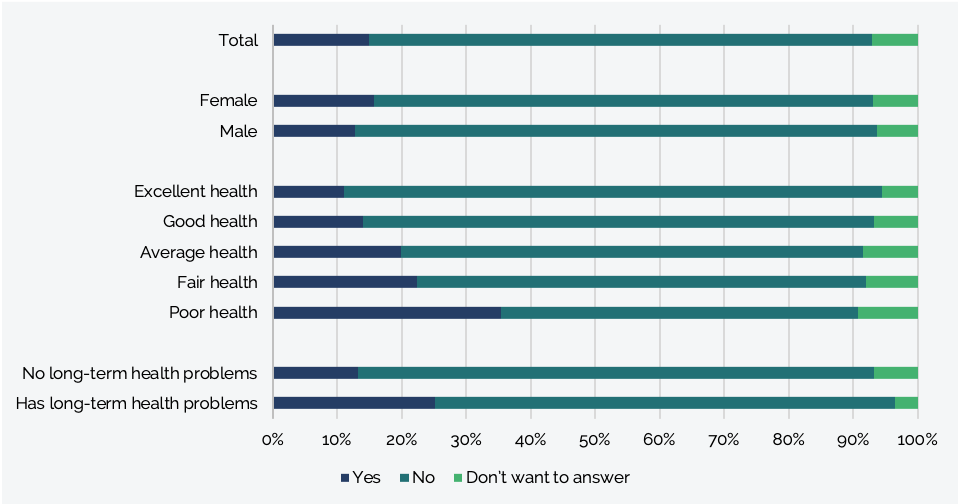
Did a doctor ever refuse to give you medical advice because your parents/guardians were not with you in the room? by gender, general health status, and existence of long-term health problems
An even higher number of respondents (28,3%) said that they avoided seeking medical advice because parents were not present with them in the room.
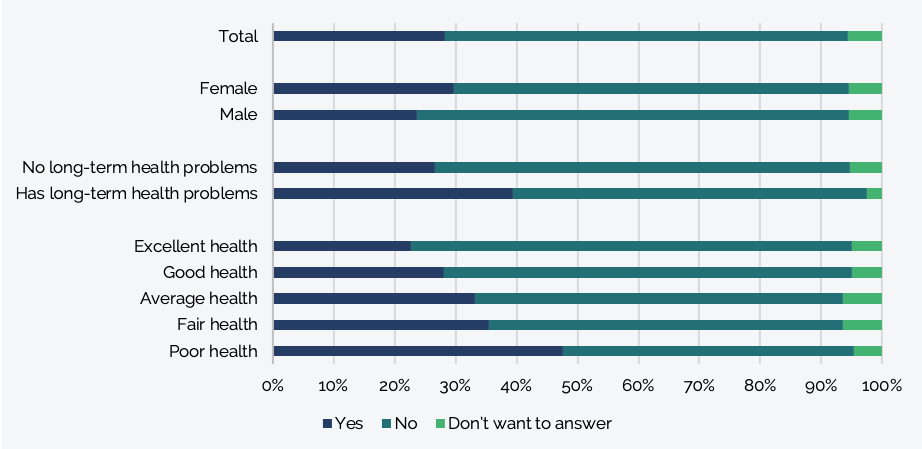
Did you ever avoid seeking medical advice because your parents/guardians had to be with you in the room? by gender, general health status, and existence of long-term health problems
The top medical issues that respondents wanted to seek advice for (but did not because their parents had to be in the room) were: mental health, sexual issues (e.g. pregnancy, avoiding diseases), and sexual orientation. In particular, females selected mental health as the issue for which they avoided seeking advice more often than males, whereas males selected sexual orientation more often than females.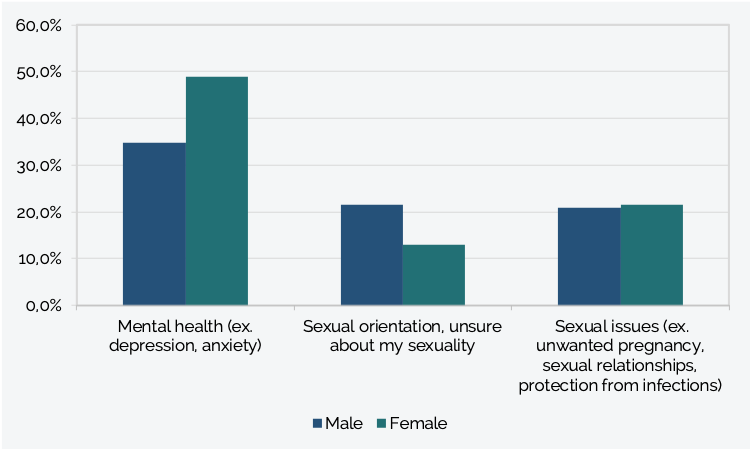
What were you seeking medical advice for? (Top 3) by gender
Female respondents were both refused medical advice by a doctor and they avoided seeking advice at slightly higher rates than males (2% more and 6,1% more, respectively). The difference between males and females was starkest when it came to issues for which respondents were avoiding to seek advice: 15,7% more females than males avoided seeking advice on mental health, and 8,6% more males than females avoided seeking medical advice on sexual orientation.
In the focus groups, many participants recognised that while it was preferable to not hide things from one’s parents, there could be instances where a young person may want to seek medical advice without parents or guardians present, including when the medical issue is too embarrassing or taboo to share with one’s parents (e.g. sexual health, mental health), if sharing with one’s parents could get one into trouble (e.g. drugs or alcohol), or if one’s parents were abusing or mistreating them and they were the reason that one would seek medical advice.
“There are some things that you cannot trust [parents] with…for example, they will beat you, punish you, and you do not want to share it with them.”
— Daria**, 16-years old, discussing reasons why a young person may want to speak to a doctor alone, without parents, in Bulgaria in a mixed gender focus group of rural youths between the ages of 14 and 17
Many focus group participants felt strongly about their right to access medical advice independently:
“Eric: But is there an explanation or… you know, my hand trembled when I wrote the age? It seems silly
Eddy: [swear words]
Karl: And what does the parent do, exactly? If the parent is there you may even feel more stressed and not know what you want.”
— Eric** (no age); Eddy** (no age); Karl**, 16-years old; discussing the minimum age to access medical advice independently in Romania in a mixed gender focus group of youths between the ages of 14 and 17
The Committee on the Rights of the Child emphasises that all adolescents have the right to access confidential medical counselling and advice without the consent of a parent or guardian, irrespective of age, if they so wish. General Comment No. 12 is clear in its argument for this, being in the best interests of the well-being and safety of the child:
“Children may need such access, for example, where they are experiencing violence or abuse at home, or in need of reproductive health education or services, or in case of conflicts between parents and the child over access to health services. The right to counselling and advice is distinct from the right to give medical consent and should not be subject to any age limit.”
What adolescents said: Views on medical treatment in five countries
Few felt capable to make their own decisions about medical treatment (such as injections) in a general sense, but the majority felt strongly about giving consent before receiving medical treatment specifically. On average, only 30,7% of respondents “agreed” or “strongly agreed” that they were capable enough to make their own medical decisions, while 68,6% “agreed” or “strongly agreed” that they should always give consent prior to receiving a medical treatment.
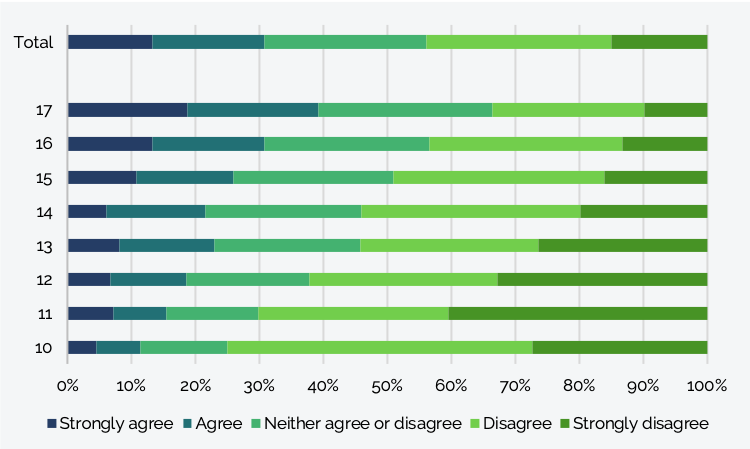
"I am capable enough to": “make my own decisions about medical treatments I could receive (e.g. injections).”
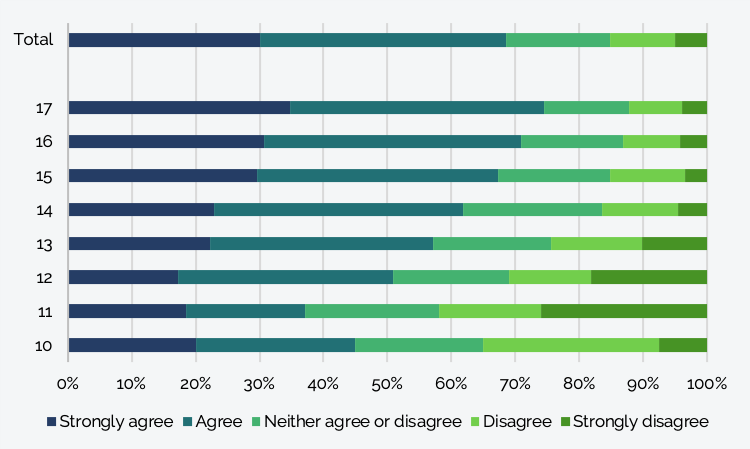
How much do you agree with the following statement? “A young person your age should always give consent to a doctor before receiving any medical treatment (e.g. injections)“ by age
When testing their knowledge of the age that a person can refuse medical treatment, only 28,1% of respondents chose the correct answer, which is broadly age 18 in all surveyed countries.* The majority of respondents (59,1%) picked an age that was incorrect and younger.
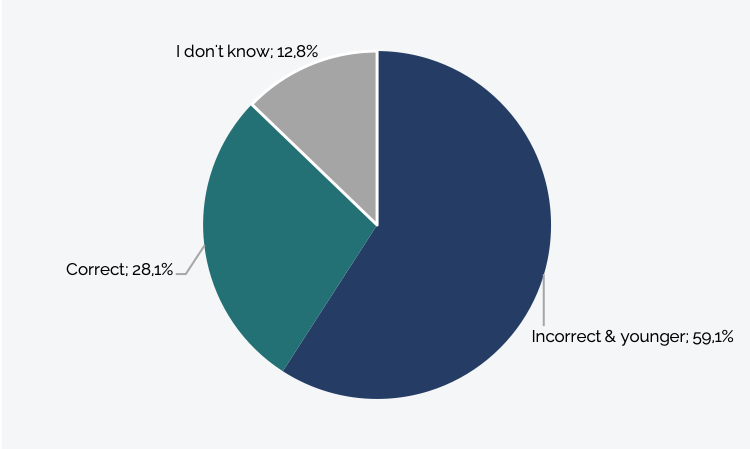
A doctor wants to give a young person medical treatment (e.g. injections). From what age can a young person refuse to receive treatment?
Nearly one-third of respondents received a medical treatment that felt forced by their parents and/or doctor, and respondents with poor general health or long-term health problems received such treatments at higher rates than healthy respondents. Even if the medical treatment was deemed to ultimately be in the best interests of the child, feeling forced indicates that their voluntary and informed consent was not sought.
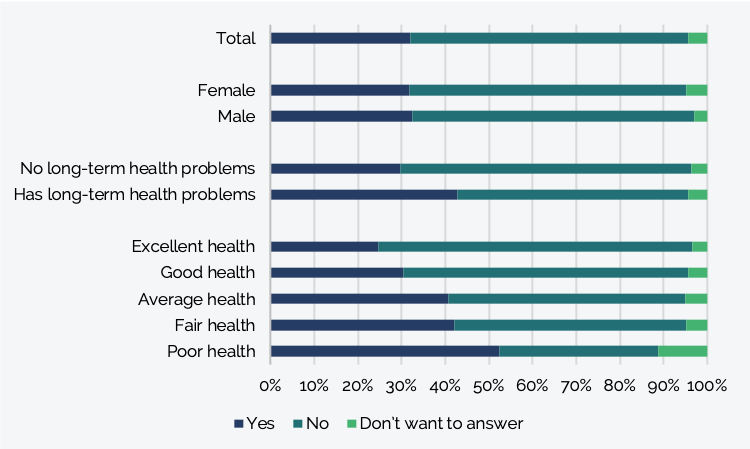
Did you ever have a medical treatment that you did not want, but were forced to by your parents/guardians or doctor? by gender, general health status and existence of long-term health problems
Discussions on medical treatment in the focus groups were complex, indicating the various considerations and contexts under which an adolescent is capable to give or refuse consent to medical treatment. Overall, many participants said that while choices should be based on what is in their best interests, their views should be considered, even if the final decision is not necessarily theirs alone to make.
In one instance, a participant spoke of a time where she was given a choice in a decision regarding partial or general anaesthesia:
“In my opinion, it must be 16, because I had a case when my parents agreed to partial anaesthesia, for example – I cannot say exactly for what – and I wanted a general [anaesthesia]. They were like, no. But the decision was mine. The doctor said, ‘you decide’. My parents were with me, yes, but it was my decision, not theirs.”
— Danka**, 17-years old, discussing her experience with making medical decisions in Bulgaria in a mixed gender focus group of vulnerable urban youths between the ages of 14 and 17
While Danka disagreed with her parents, we can assume that when provided with full, youth-friendly information about the treatment and possible consequences, the child, doctor, and parents could come to full agreement on the best course of action for her health.
The Committee on the Rights of the Child does not recommend a specific minimum age at which children should have the right to consent, but rather that children have the right to be actively involved in health decisions, in consideration of their individual capacity, and not just their age. General Comment No. 20 emphasises the importance of obtaining voluntary and informed consent of the adolescent, whether or not the consent of a parent or guardian is required.
Additionally, General Comment No. 12 encourages countries to introduce a minimum age at which the right to consent transfers to the child, and even below this age, their view should be given due weight if they can demonstrate capacity.
*As many laws have several exceptions and considerations, the most widely applicable ages were used in the consultation. This is to ensure that ages would be easy to understand by adolescent participants for the sake of discussion. For more on the legal minimum ages used in the consultation, please see our Methodology.
**Names have been changed to protect the privacy and confidentiality of focus group participants. For more on ethical considerations when conducting research with adolescents, please see our Methodology.